Company and Association Law Assignment: Duties of Directors, LAWS19032
VerifiedAdded on 2022/10/10
|11
|2432
|379
Homework Assignment
AI Summary
This assignment provides a comprehensive analysis of company law in Australia, focusing on the duties of company directors. It begins by outlining both the fiduciary duties derived from common law and the statutory duties mandated by the Corporations Act 2001. The assignment details the specific obligations of directors, including acting in good faith, avoiding conflicts of interest, exercising due care and diligence, and protecting confidential information. It then examines the case of Regal (Hastings) Ltd v Gulliver, illustrating the application of these duties, particularly the corporate opportunity doctrine. The assignment further explores the implications of a company transitioning from private to public status, highlighting the changes in director requirements, capital raising, and disclosure obligations. The document thoroughly compares and contrasts the fiduciary and statutory duties, providing a clear understanding of the legal framework governing company directors in Australia.
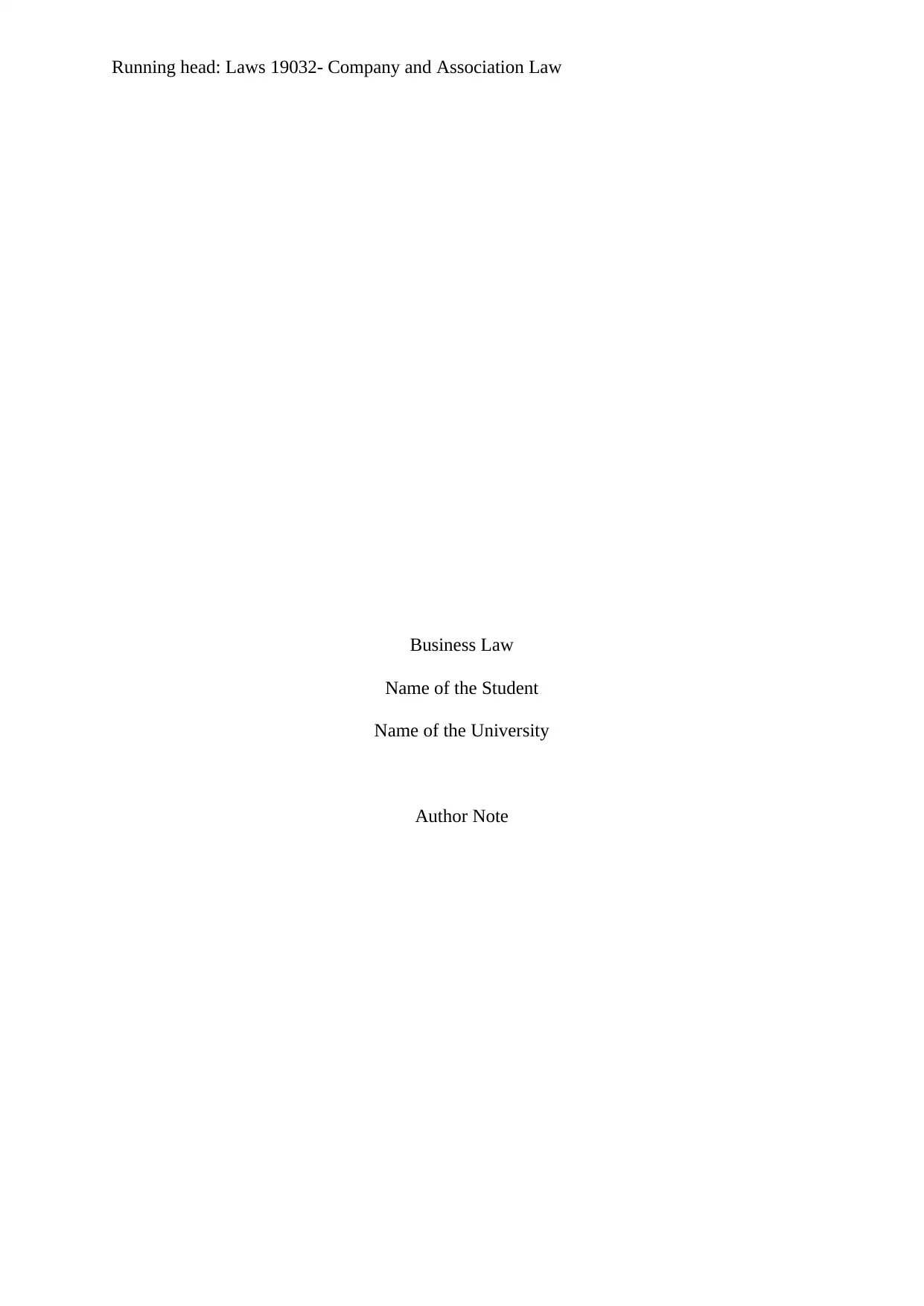
Running head: Laws 19032- Company and Association Law
Business Law
Name of the Student
Name of the University
Author Note
Business Law
Name of the Student
Name of the University
Author Note
Paraphrase This Document
Need a fresh take? Get an instant paraphrase of this document with our AI Paraphraser

1Laws 19032- Company and Association Law
Table of Contents
Question 1......................................................................................................................2
Question 2......................................................................................................................6
Question 3......................................................................................................................8
Bibliography.................................................................................................................11
Table of Contents
Question 1......................................................................................................................2
Question 2......................................................................................................................6
Question 3......................................................................................................................8
Bibliography.................................................................................................................11
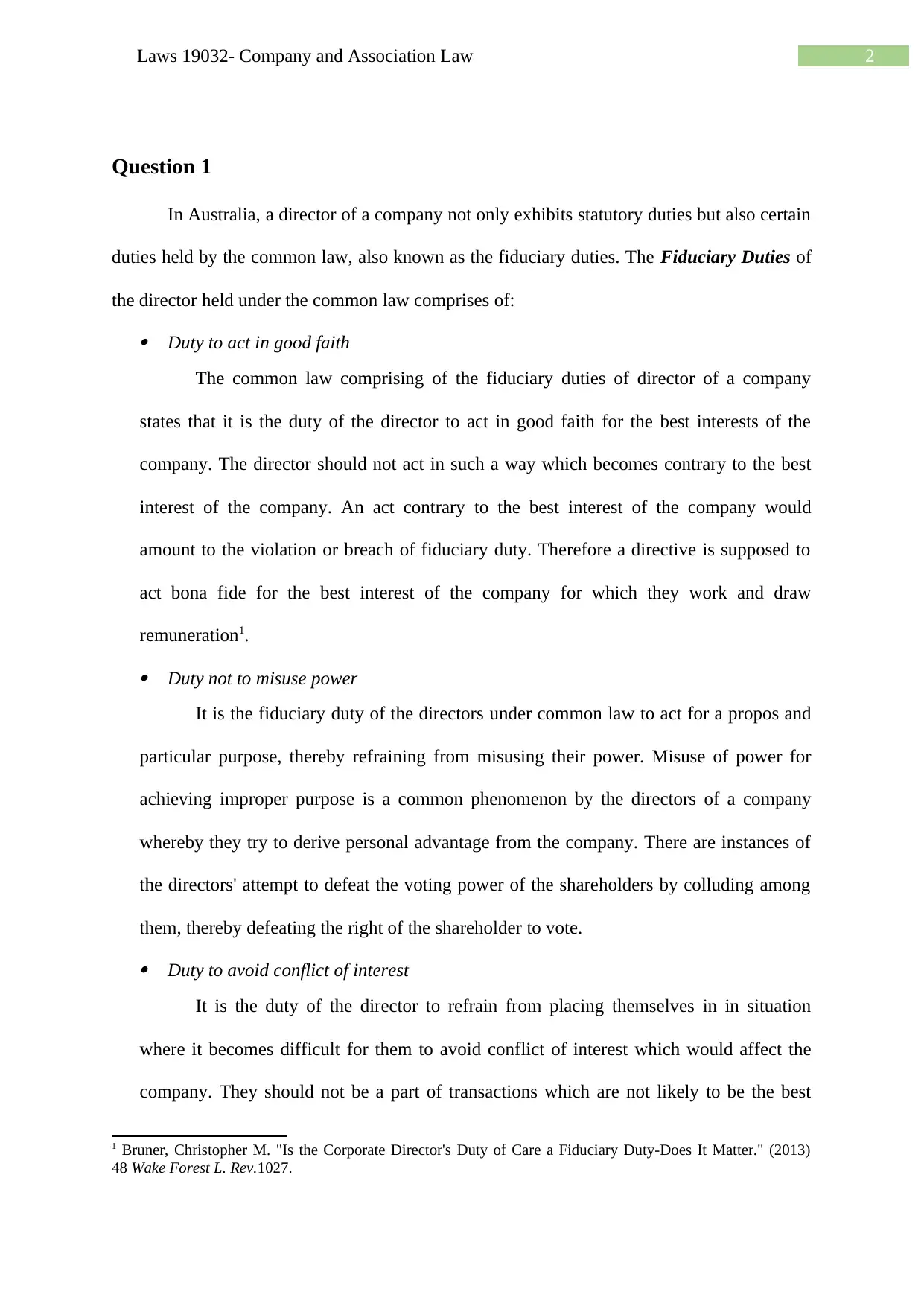
2Laws 19032- Company and Association Law
Question 1
In Australia, a director of a company not only exhibits statutory duties but also certain
duties held by the common law, also known as the fiduciary duties. The Fiduciary Duties of
the director held under the common law comprises of: Duty to act in good faith
The common law comprising of the fiduciary duties of director of a company
states that it is the duty of the director to act in good faith for the best interests of the
company. The director should not act in such a way which becomes contrary to the best
interest of the company. An act contrary to the best interest of the company would
amount to the violation or breach of fiduciary duty. Therefore a directive is supposed to
act bona fide for the best interest of the company for which they work and draw
remuneration1. Duty not to misuse power
It is the fiduciary duty of the directors under common law to act for a propos and
particular purpose, thereby refraining from misusing their power. Misuse of power for
achieving improper purpose is a common phenomenon by the directors of a company
whereby they try to derive personal advantage from the company. There are instances of
the directors' attempt to defeat the voting power of the shareholders by colluding among
them, thereby defeating the right of the shareholder to vote. Duty to avoid conflict of interest
It is the duty of the director to refrain from placing themselves in in situation
where it becomes difficult for them to avoid conflict of interest which would affect the
company. They should not be a part of transactions which are not likely to be the best
1 Bruner, Christopher M. "Is the Corporate Director's Duty of Care a Fiduciary Duty-Does It Matter." (2013)
48 Wake Forest L. Rev.1027.
Question 1
In Australia, a director of a company not only exhibits statutory duties but also certain
duties held by the common law, also known as the fiduciary duties. The Fiduciary Duties of
the director held under the common law comprises of: Duty to act in good faith
The common law comprising of the fiduciary duties of director of a company
states that it is the duty of the director to act in good faith for the best interests of the
company. The director should not act in such a way which becomes contrary to the best
interest of the company. An act contrary to the best interest of the company would
amount to the violation or breach of fiduciary duty. Therefore a directive is supposed to
act bona fide for the best interest of the company for which they work and draw
remuneration1. Duty not to misuse power
It is the fiduciary duty of the directors under common law to act for a propos and
particular purpose, thereby refraining from misusing their power. Misuse of power for
achieving improper purpose is a common phenomenon by the directors of a company
whereby they try to derive personal advantage from the company. There are instances of
the directors' attempt to defeat the voting power of the shareholders by colluding among
them, thereby defeating the right of the shareholder to vote. Duty to avoid conflict of interest
It is the duty of the director to refrain from placing themselves in in situation
where it becomes difficult for them to avoid conflict of interest which would affect the
company. They should not be a part of transactions which are not likely to be the best
1 Bruner, Christopher M. "Is the Corporate Director's Duty of Care a Fiduciary Duty-Does It Matter." (2013)
48 Wake Forest L. Rev.1027.
⊘ This is a preview!⊘
Do you want full access?
Subscribe today to unlock all pages.

Trusted by 1+ million students worldwide
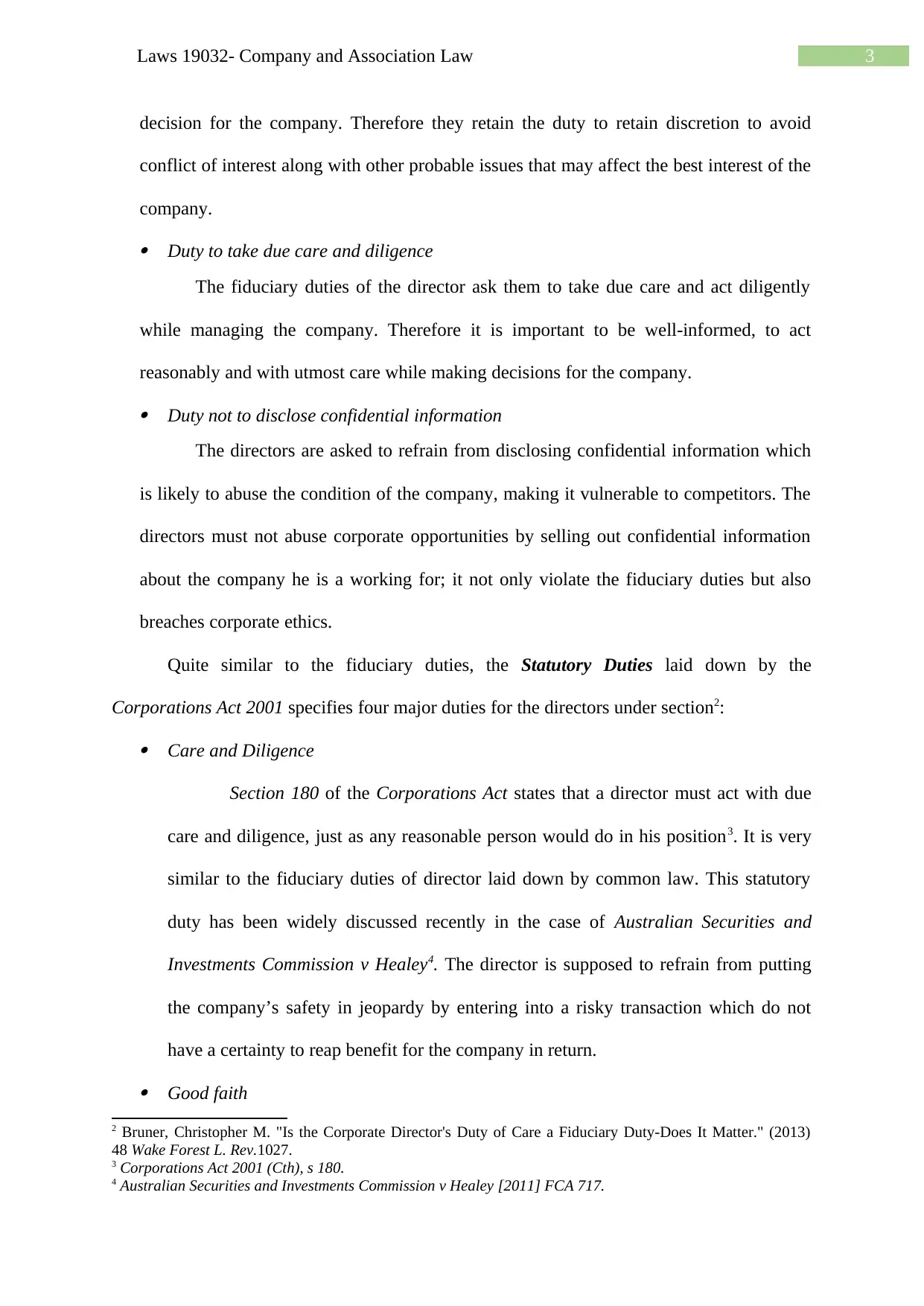
3Laws 19032- Company and Association Law
decision for the company. Therefore they retain the duty to retain discretion to avoid
conflict of interest along with other probable issues that may affect the best interest of the
company. Duty to take due care and diligence
The fiduciary duties of the director ask them to take due care and act diligently
while managing the company. Therefore it is important to be well-informed, to act
reasonably and with utmost care while making decisions for the company. Duty not to disclose confidential information
The directors are asked to refrain from disclosing confidential information which
is likely to abuse the condition of the company, making it vulnerable to competitors. The
directors must not abuse corporate opportunities by selling out confidential information
about the company he is a working for; it not only violate the fiduciary duties but also
breaches corporate ethics.
Quite similar to the fiduciary duties, the Statutory Duties laid down by the
Corporations Act 2001 specifies four major duties for the directors under section2: Care and Diligence
Section 180 of the Corporations Act states that a director must act with due
care and diligence, just as any reasonable person would do in his position3. It is very
similar to the fiduciary duties of director laid down by common law. This statutory
duty has been widely discussed recently in the case of Australian Securities and
Investments Commission v Healey4. The director is supposed to refrain from putting
the company’s safety in jeopardy by entering into a risky transaction which do not
have a certainty to reap benefit for the company in return. Good faith
2 Bruner, Christopher M. "Is the Corporate Director's Duty of Care a Fiduciary Duty-Does It Matter." (2013)
48 Wake Forest L. Rev.1027.
3 Corporations Act 2001 (Cth), s 180.
4 Australian Securities and Investments Commission v Healey [2011] FCA 717.
decision for the company. Therefore they retain the duty to retain discretion to avoid
conflict of interest along with other probable issues that may affect the best interest of the
company. Duty to take due care and diligence
The fiduciary duties of the director ask them to take due care and act diligently
while managing the company. Therefore it is important to be well-informed, to act
reasonably and with utmost care while making decisions for the company. Duty not to disclose confidential information
The directors are asked to refrain from disclosing confidential information which
is likely to abuse the condition of the company, making it vulnerable to competitors. The
directors must not abuse corporate opportunities by selling out confidential information
about the company he is a working for; it not only violate the fiduciary duties but also
breaches corporate ethics.
Quite similar to the fiduciary duties, the Statutory Duties laid down by the
Corporations Act 2001 specifies four major duties for the directors under section2: Care and Diligence
Section 180 of the Corporations Act states that a director must act with due
care and diligence, just as any reasonable person would do in his position3. It is very
similar to the fiduciary duties of director laid down by common law. This statutory
duty has been widely discussed recently in the case of Australian Securities and
Investments Commission v Healey4. The director is supposed to refrain from putting
the company’s safety in jeopardy by entering into a risky transaction which do not
have a certainty to reap benefit for the company in return. Good faith
2 Bruner, Christopher M. "Is the Corporate Director's Duty of Care a Fiduciary Duty-Does It Matter." (2013)
48 Wake Forest L. Rev.1027.
3 Corporations Act 2001 (Cth), s 180.
4 Australian Securities and Investments Commission v Healey [2011] FCA 717.
Paraphrase This Document
Need a fresh take? Get an instant paraphrase of this document with our AI Paraphraser
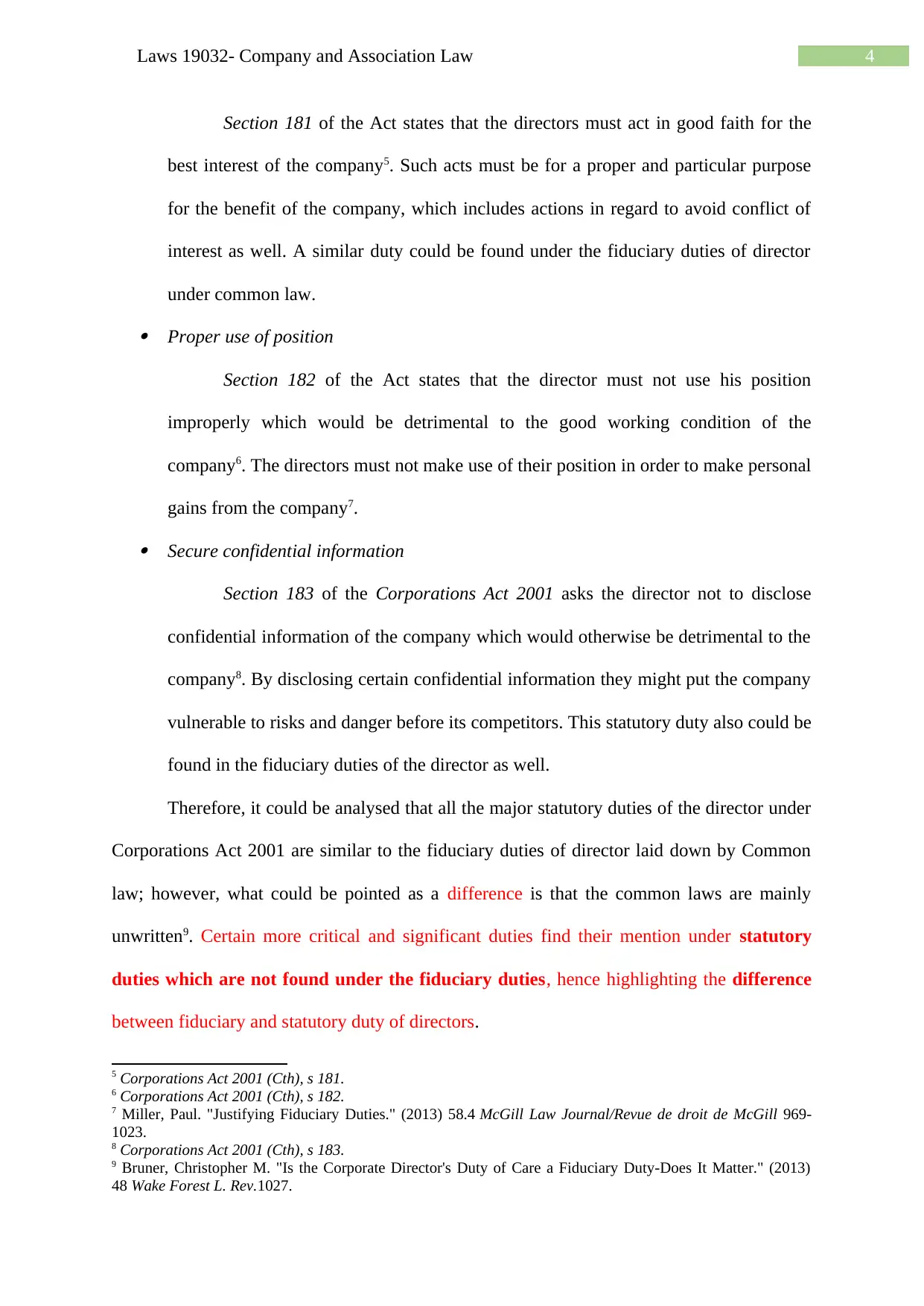
4Laws 19032- Company and Association Law
Section 181 of the Act states that the directors must act in good faith for the
best interest of the company5. Such acts must be for a proper and particular purpose
for the benefit of the company, which includes actions in regard to avoid conflict of
interest as well. A similar duty could be found under the fiduciary duties of director
under common law. Proper use of position
Section 182 of the Act states that the director must not use his position
improperly which would be detrimental to the good working condition of the
company6. The directors must not make use of their position in order to make personal
gains from the company7. Secure confidential information
Section 183 of the Corporations Act 2001 asks the director not to disclose
confidential information of the company which would otherwise be detrimental to the
company8. By disclosing certain confidential information they might put the company
vulnerable to risks and danger before its competitors. This statutory duty also could be
found in the fiduciary duties of the director as well.
Therefore, it could be analysed that all the major statutory duties of the director under
Corporations Act 2001 are similar to the fiduciary duties of director laid down by Common
law; however, what could be pointed as a difference is that the common laws are mainly
unwritten9. Certain more critical and significant duties find their mention under statutory
duties which are not found under the fiduciary duties, hence highlighting the difference
between fiduciary and statutory duty of directors.
5 Corporations Act 2001 (Cth), s 181.
6 Corporations Act 2001 (Cth), s 182.
7 Miller, Paul. "Justifying Fiduciary Duties." (2013) 58.4 McGill Law Journal/Revue de droit de McGill 969-
1023.
8 Corporations Act 2001 (Cth), s 183.
9 Bruner, Christopher M. "Is the Corporate Director's Duty of Care a Fiduciary Duty-Does It Matter." (2013)
48 Wake Forest L. Rev.1027.
Section 181 of the Act states that the directors must act in good faith for the
best interest of the company5. Such acts must be for a proper and particular purpose
for the benefit of the company, which includes actions in regard to avoid conflict of
interest as well. A similar duty could be found under the fiduciary duties of director
under common law. Proper use of position
Section 182 of the Act states that the director must not use his position
improperly which would be detrimental to the good working condition of the
company6. The directors must not make use of their position in order to make personal
gains from the company7. Secure confidential information
Section 183 of the Corporations Act 2001 asks the director not to disclose
confidential information of the company which would otherwise be detrimental to the
company8. By disclosing certain confidential information they might put the company
vulnerable to risks and danger before its competitors. This statutory duty also could be
found in the fiduciary duties of the director as well.
Therefore, it could be analysed that all the major statutory duties of the director under
Corporations Act 2001 are similar to the fiduciary duties of director laid down by Common
law; however, what could be pointed as a difference is that the common laws are mainly
unwritten9. Certain more critical and significant duties find their mention under statutory
duties which are not found under the fiduciary duties, hence highlighting the difference
between fiduciary and statutory duty of directors.
5 Corporations Act 2001 (Cth), s 181.
6 Corporations Act 2001 (Cth), s 182.
7 Miller, Paul. "Justifying Fiduciary Duties." (2013) 58.4 McGill Law Journal/Revue de droit de McGill 969-
1023.
8 Corporations Act 2001 (Cth), s 183.
9 Bruner, Christopher M. "Is the Corporate Director's Duty of Care a Fiduciary Duty-Does It Matter." (2013)
48 Wake Forest L. Rev.1027.
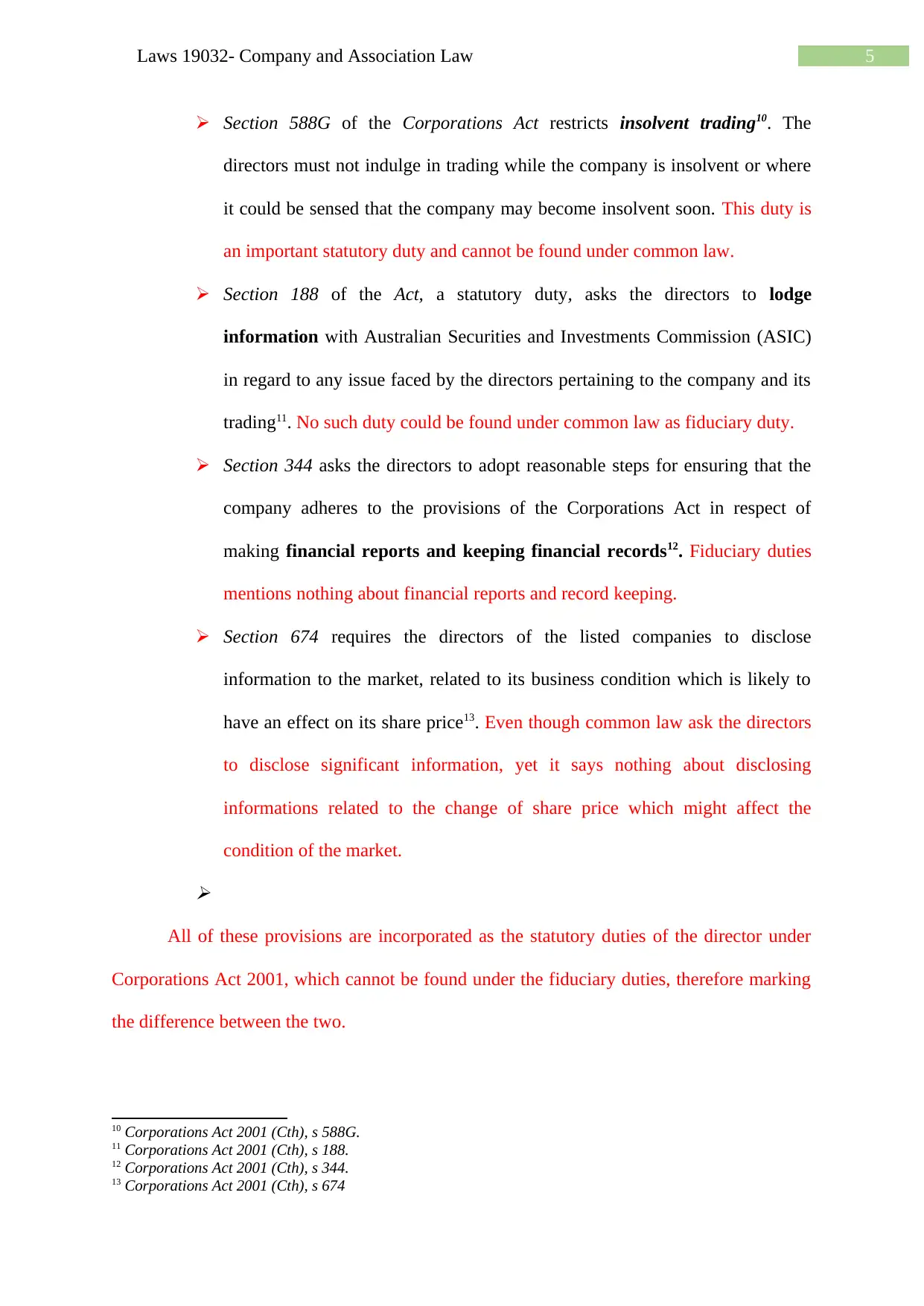
5Laws 19032- Company and Association Law
Section 588G of the Corporations Act restricts insolvent trading10. The
directors must not indulge in trading while the company is insolvent or where
it could be sensed that the company may become insolvent soon. This duty is
an important statutory duty and cannot be found under common law.
Section 188 of the Act, a statutory duty, asks the directors to lodge
information with Australian Securities and Investments Commission (ASIC)
in regard to any issue faced by the directors pertaining to the company and its
trading11. No such duty could be found under common law as fiduciary duty.
Section 344 asks the directors to adopt reasonable steps for ensuring that the
company adheres to the provisions of the Corporations Act in respect of
making financial reports and keeping financial records12. Fiduciary duties
mentions nothing about financial reports and record keeping.
Section 674 requires the directors of the listed companies to disclose
information to the market, related to its business condition which is likely to
have an effect on its share price13. Even though common law ask the directors
to disclose significant information, yet it says nothing about disclosing
informations related to the change of share price which might affect the
condition of the market.
All of these provisions are incorporated as the statutory duties of the director under
Corporations Act 2001, which cannot be found under the fiduciary duties, therefore marking
the difference between the two.
10 Corporations Act 2001 (Cth), s 588G.
11 Corporations Act 2001 (Cth), s 188.
12 Corporations Act 2001 (Cth), s 344.
13 Corporations Act 2001 (Cth), s 674
Section 588G of the Corporations Act restricts insolvent trading10. The
directors must not indulge in trading while the company is insolvent or where
it could be sensed that the company may become insolvent soon. This duty is
an important statutory duty and cannot be found under common law.
Section 188 of the Act, a statutory duty, asks the directors to lodge
information with Australian Securities and Investments Commission (ASIC)
in regard to any issue faced by the directors pertaining to the company and its
trading11. No such duty could be found under common law as fiduciary duty.
Section 344 asks the directors to adopt reasonable steps for ensuring that the
company adheres to the provisions of the Corporations Act in respect of
making financial reports and keeping financial records12. Fiduciary duties
mentions nothing about financial reports and record keeping.
Section 674 requires the directors of the listed companies to disclose
information to the market, related to its business condition which is likely to
have an effect on its share price13. Even though common law ask the directors
to disclose significant information, yet it says nothing about disclosing
informations related to the change of share price which might affect the
condition of the market.
All of these provisions are incorporated as the statutory duties of the director under
Corporations Act 2001, which cannot be found under the fiduciary duties, therefore marking
the difference between the two.
10 Corporations Act 2001 (Cth), s 588G.
11 Corporations Act 2001 (Cth), s 188.
12 Corporations Act 2001 (Cth), s 344.
13 Corporations Act 2001 (Cth), s 674
⊘ This is a preview!⊘
Do you want full access?
Subscribe today to unlock all pages.

Trusted by 1+ million students worldwide
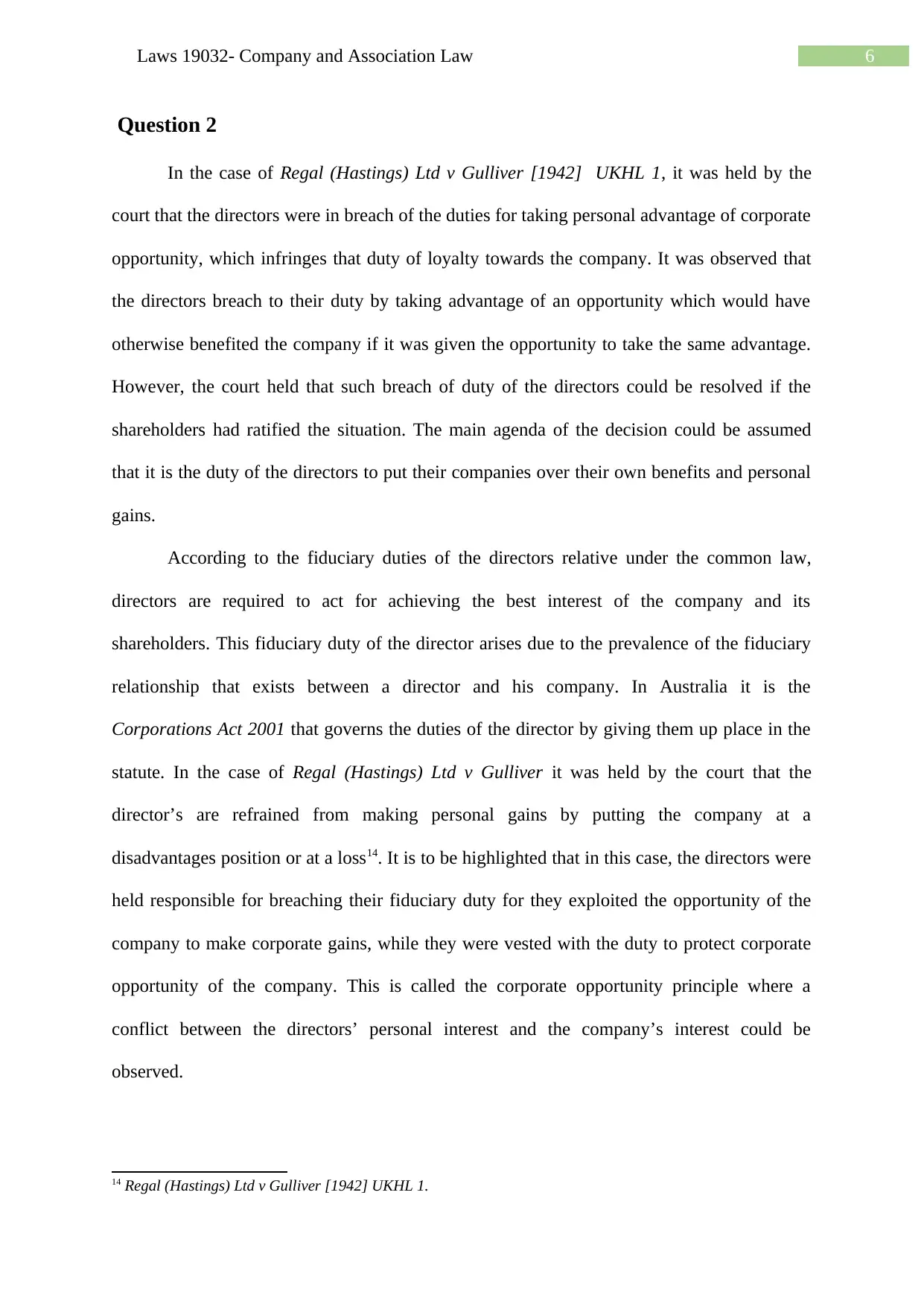
6Laws 19032- Company and Association Law
Question 2
In the case of Regal (Hastings) Ltd v Gulliver [1942] UKHL 1, it was held by the
court that the directors were in breach of the duties for taking personal advantage of corporate
opportunity, which infringes that duty of loyalty towards the company. It was observed that
the directors breach to their duty by taking advantage of an opportunity which would have
otherwise benefited the company if it was given the opportunity to take the same advantage.
However, the court held that such breach of duty of the directors could be resolved if the
shareholders had ratified the situation. The main agenda of the decision could be assumed
that it is the duty of the directors to put their companies over their own benefits and personal
gains.
According to the fiduciary duties of the directors relative under the common law,
directors are required to act for achieving the best interest of the company and its
shareholders. This fiduciary duty of the director arises due to the prevalence of the fiduciary
relationship that exists between a director and his company. In Australia it is the
Corporations Act 2001 that governs the duties of the director by giving them up place in the
statute. In the case of Regal (Hastings) Ltd v Gulliver it was held by the court that the
director’s are refrained from making personal gains by putting the company at a
disadvantages position or at a loss14. It is to be highlighted that in this case, the directors were
held responsible for breaching their fiduciary duty for they exploited the opportunity of the
company to make corporate gains, while they were vested with the duty to protect corporate
opportunity of the company. This is called the corporate opportunity principle where a
conflict between the directors’ personal interest and the company’s interest could be
observed.
14 Regal (Hastings) Ltd v Gulliver [1942] UKHL 1.
Question 2
In the case of Regal (Hastings) Ltd v Gulliver [1942] UKHL 1, it was held by the
court that the directors were in breach of the duties for taking personal advantage of corporate
opportunity, which infringes that duty of loyalty towards the company. It was observed that
the directors breach to their duty by taking advantage of an opportunity which would have
otherwise benefited the company if it was given the opportunity to take the same advantage.
However, the court held that such breach of duty of the directors could be resolved if the
shareholders had ratified the situation. The main agenda of the decision could be assumed
that it is the duty of the directors to put their companies over their own benefits and personal
gains.
According to the fiduciary duties of the directors relative under the common law,
directors are required to act for achieving the best interest of the company and its
shareholders. This fiduciary duty of the director arises due to the prevalence of the fiduciary
relationship that exists between a director and his company. In Australia it is the
Corporations Act 2001 that governs the duties of the director by giving them up place in the
statute. In the case of Regal (Hastings) Ltd v Gulliver it was held by the court that the
director’s are refrained from making personal gains by putting the company at a
disadvantages position or at a loss14. It is to be highlighted that in this case, the directors were
held responsible for breaching their fiduciary duty for they exploited the opportunity of the
company to make corporate gains, while they were vested with the duty to protect corporate
opportunity of the company. This is called the corporate opportunity principle where a
conflict between the directors’ personal interest and the company’s interest could be
observed.
14 Regal (Hastings) Ltd v Gulliver [1942] UKHL 1.
Paraphrase This Document
Need a fresh take? Get an instant paraphrase of this document with our AI Paraphraser
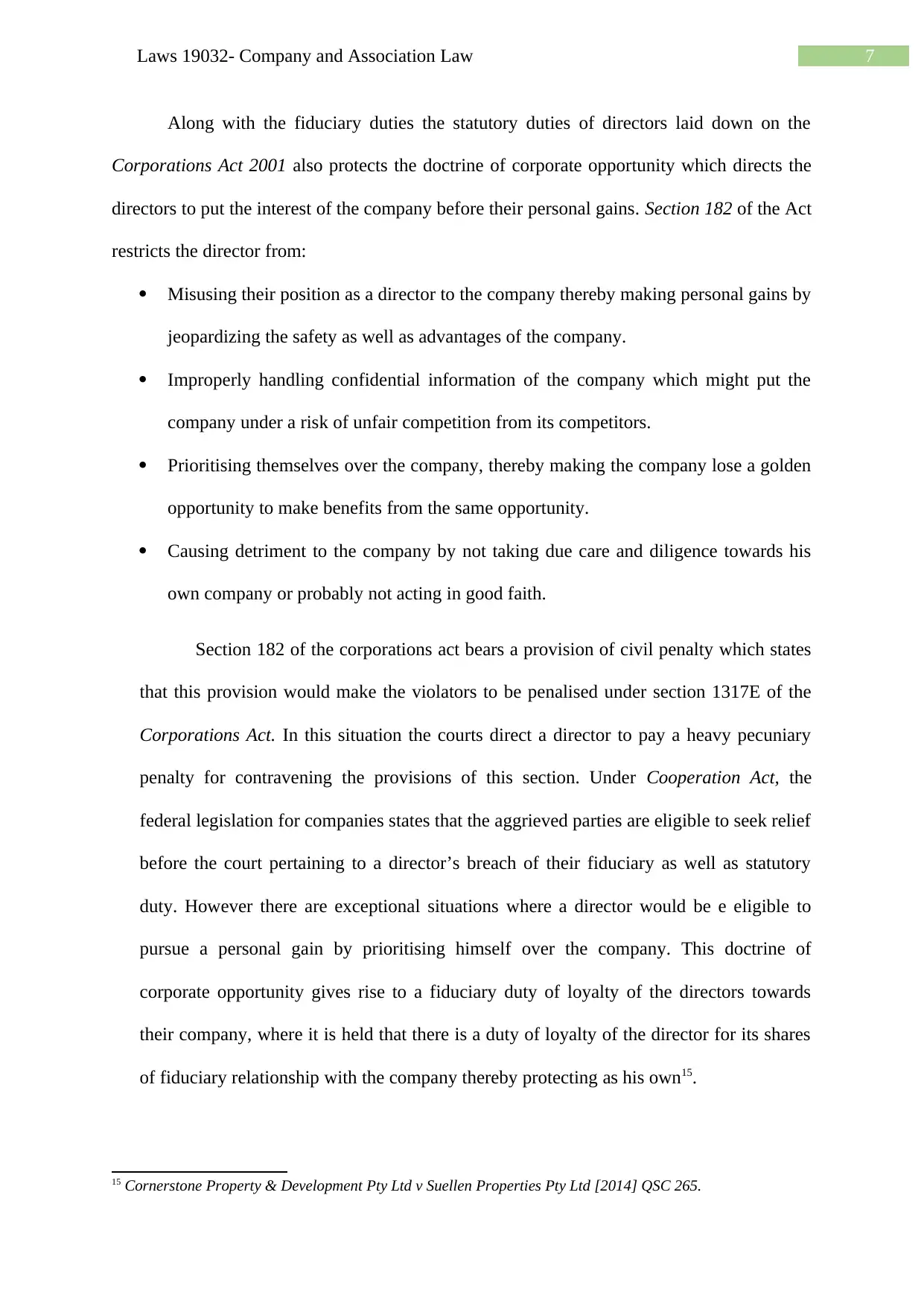
7Laws 19032- Company and Association Law
Along with the fiduciary duties the statutory duties of directors laid down on the
Corporations Act 2001 also protects the doctrine of corporate opportunity which directs the
directors to put the interest of the company before their personal gains. Section 182 of the Act
restricts the director from:
Misusing their position as a director to the company thereby making personal gains by
jeopardizing the safety as well as advantages of the company.
Improperly handling confidential information of the company which might put the
company under a risk of unfair competition from its competitors.
Prioritising themselves over the company, thereby making the company lose a golden
opportunity to make benefits from the same opportunity.
Causing detriment to the company by not taking due care and diligence towards his
own company or probably not acting in good faith.
Section 182 of the corporations act bears a provision of civil penalty which states
that this provision would make the violators to be penalised under section 1317E of the
Corporations Act. In this situation the courts direct a director to pay a heavy pecuniary
penalty for contravening the provisions of this section. Under Cooperation Act, the
federal legislation for companies states that the aggrieved parties are eligible to seek relief
before the court pertaining to a director’s breach of their fiduciary as well as statutory
duty. However there are exceptional situations where a director would be e eligible to
pursue a personal gain by prioritising himself over the company. This doctrine of
corporate opportunity gives rise to a fiduciary duty of loyalty of the directors towards
their company, where it is held that there is a duty of loyalty of the director for its shares
of fiduciary relationship with the company thereby protecting as his own15.
15 Cornerstone Property & Development Pty Ltd v Suellen Properties Pty Ltd [2014] QSC 265.
Along with the fiduciary duties the statutory duties of directors laid down on the
Corporations Act 2001 also protects the doctrine of corporate opportunity which directs the
directors to put the interest of the company before their personal gains. Section 182 of the Act
restricts the director from:
Misusing their position as a director to the company thereby making personal gains by
jeopardizing the safety as well as advantages of the company.
Improperly handling confidential information of the company which might put the
company under a risk of unfair competition from its competitors.
Prioritising themselves over the company, thereby making the company lose a golden
opportunity to make benefits from the same opportunity.
Causing detriment to the company by not taking due care and diligence towards his
own company or probably not acting in good faith.
Section 182 of the corporations act bears a provision of civil penalty which states
that this provision would make the violators to be penalised under section 1317E of the
Corporations Act. In this situation the courts direct a director to pay a heavy pecuniary
penalty for contravening the provisions of this section. Under Cooperation Act, the
federal legislation for companies states that the aggrieved parties are eligible to seek relief
before the court pertaining to a director’s breach of their fiduciary as well as statutory
duty. However there are exceptional situations where a director would be e eligible to
pursue a personal gain by prioritising himself over the company. This doctrine of
corporate opportunity gives rise to a fiduciary duty of loyalty of the directors towards
their company, where it is held that there is a duty of loyalty of the director for its shares
of fiduciary relationship with the company thereby protecting as his own15.
15 Cornerstone Property & Development Pty Ltd v Suellen Properties Pty Ltd [2014] QSC 265.
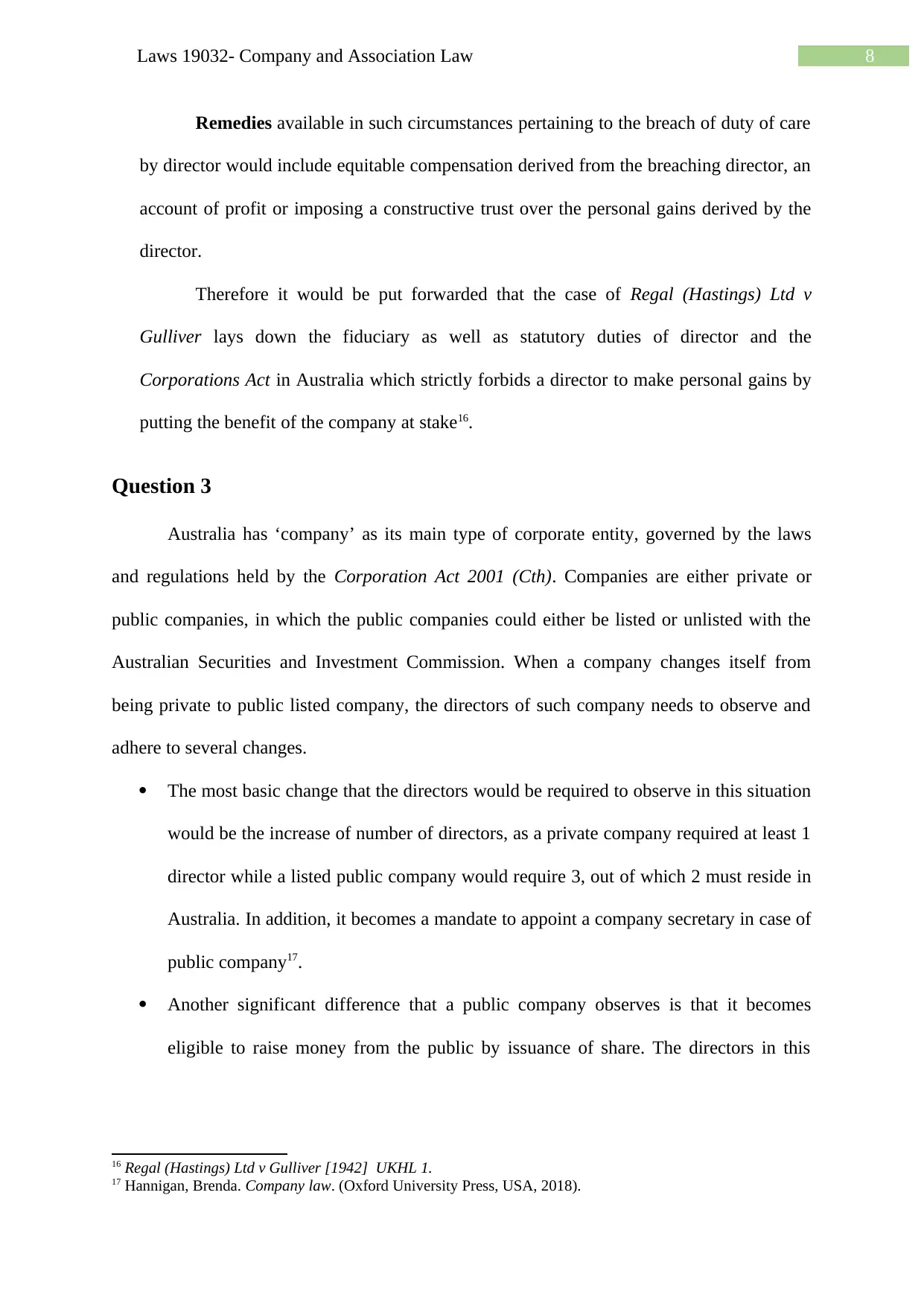
8Laws 19032- Company and Association Law
Remedies available in such circumstances pertaining to the breach of duty of care
by director would include equitable compensation derived from the breaching director, an
account of profit or imposing a constructive trust over the personal gains derived by the
director.
Therefore it would be put forwarded that the case of Regal (Hastings) Ltd v
Gulliver lays down the fiduciary as well as statutory duties of director and the
Corporations Act in Australia which strictly forbids a director to make personal gains by
putting the benefit of the company at stake16.
Question 3
Australia has ‘company’ as its main type of corporate entity, governed by the laws
and regulations held by the Corporation Act 2001 (Cth). Companies are either private or
public companies, in which the public companies could either be listed or unlisted with the
Australian Securities and Investment Commission. When a company changes itself from
being private to public listed company, the directors of such company needs to observe and
adhere to several changes.
The most basic change that the directors would be required to observe in this situation
would be the increase of number of directors, as a private company required at least 1
director while a listed public company would require 3, out of which 2 must reside in
Australia. In addition, it becomes a mandate to appoint a company secretary in case of
public company17.
Another significant difference that a public company observes is that it becomes
eligible to raise money from the public by issuance of share. The directors in this
16 Regal (Hastings) Ltd v Gulliver [1942] UKHL 1.
17 Hannigan, Brenda. Company law. (Oxford University Press, USA, 2018).
Remedies available in such circumstances pertaining to the breach of duty of care
by director would include equitable compensation derived from the breaching director, an
account of profit or imposing a constructive trust over the personal gains derived by the
director.
Therefore it would be put forwarded that the case of Regal (Hastings) Ltd v
Gulliver lays down the fiduciary as well as statutory duties of director and the
Corporations Act in Australia which strictly forbids a director to make personal gains by
putting the benefit of the company at stake16.
Question 3
Australia has ‘company’ as its main type of corporate entity, governed by the laws
and regulations held by the Corporation Act 2001 (Cth). Companies are either private or
public companies, in which the public companies could either be listed or unlisted with the
Australian Securities and Investment Commission. When a company changes itself from
being private to public listed company, the directors of such company needs to observe and
adhere to several changes.
The most basic change that the directors would be required to observe in this situation
would be the increase of number of directors, as a private company required at least 1
director while a listed public company would require 3, out of which 2 must reside in
Australia. In addition, it becomes a mandate to appoint a company secretary in case of
public company17.
Another significant difference that a public company observes is that it becomes
eligible to raise money from the public by issuance of share. The directors in this
16 Regal (Hastings) Ltd v Gulliver [1942] UKHL 1.
17 Hannigan, Brenda. Company law. (Oxford University Press, USA, 2018).
⊘ This is a preview!⊘
Do you want full access?
Subscribe today to unlock all pages.

Trusted by 1+ million students worldwide
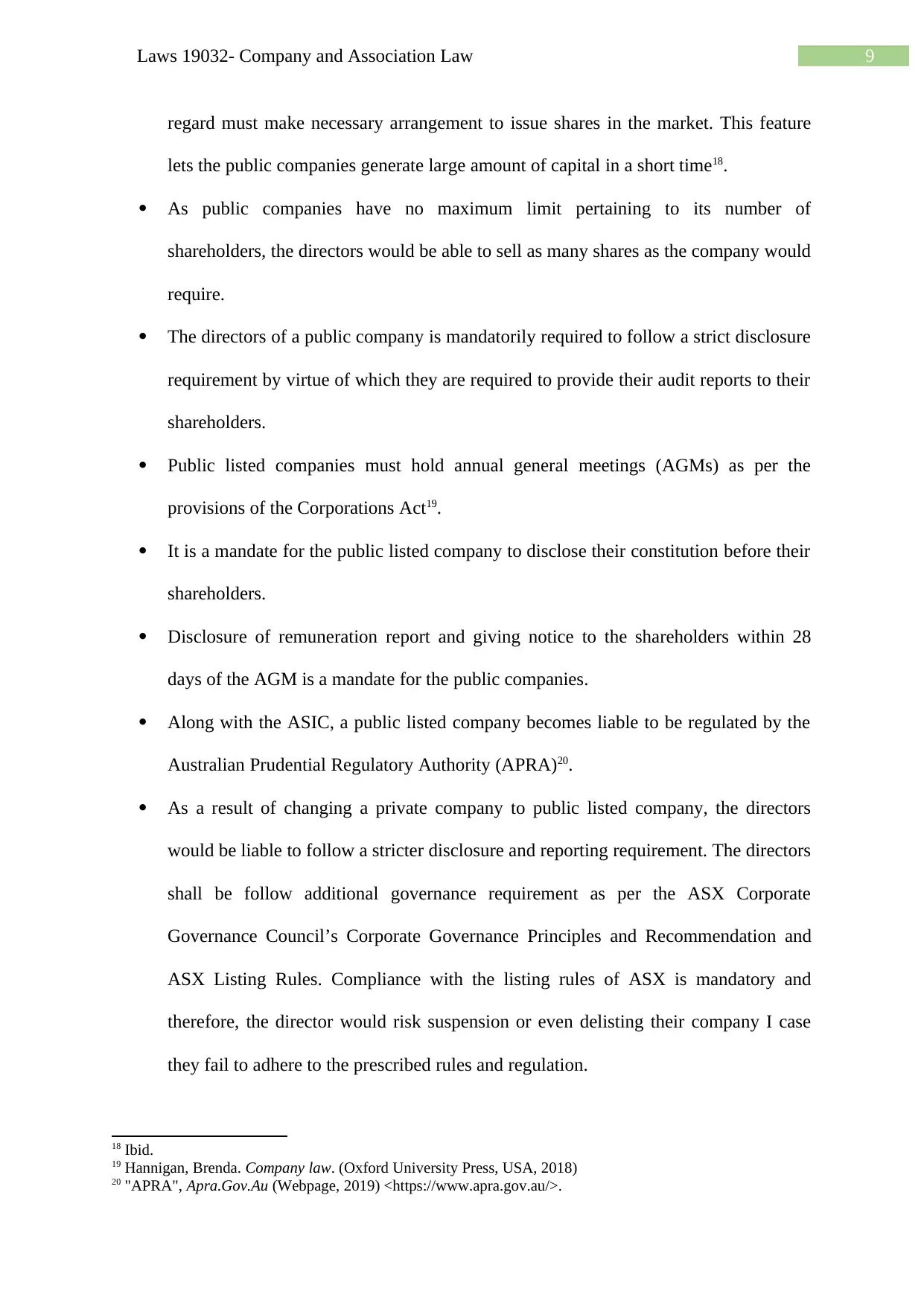
9Laws 19032- Company and Association Law
regard must make necessary arrangement to issue shares in the market. This feature
lets the public companies generate large amount of capital in a short time18.
As public companies have no maximum limit pertaining to its number of
shareholders, the directors would be able to sell as many shares as the company would
require.
The directors of a public company is mandatorily required to follow a strict disclosure
requirement by virtue of which they are required to provide their audit reports to their
shareholders.
Public listed companies must hold annual general meetings (AGMs) as per the
provisions of the Corporations Act19.
It is a mandate for the public listed company to disclose their constitution before their
shareholders.
Disclosure of remuneration report and giving notice to the shareholders within 28
days of the AGM is a mandate for the public companies.
Along with the ASIC, a public listed company becomes liable to be regulated by the
Australian Prudential Regulatory Authority (APRA)20.
As a result of changing a private company to public listed company, the directors
would be liable to follow a stricter disclosure and reporting requirement. The directors
shall be follow additional governance requirement as per the ASX Corporate
Governance Council’s Corporate Governance Principles and Recommendation and
ASX Listing Rules. Compliance with the listing rules of ASX is mandatory and
therefore, the director would risk suspension or even delisting their company I case
they fail to adhere to the prescribed rules and regulation.
18 Ibid.
19 Hannigan, Brenda. Company law. (Oxford University Press, USA, 2018)
20 "APRA", Apra.Gov.Au (Webpage, 2019) <https://www.apra.gov.au/>.
regard must make necessary arrangement to issue shares in the market. This feature
lets the public companies generate large amount of capital in a short time18.
As public companies have no maximum limit pertaining to its number of
shareholders, the directors would be able to sell as many shares as the company would
require.
The directors of a public company is mandatorily required to follow a strict disclosure
requirement by virtue of which they are required to provide their audit reports to their
shareholders.
Public listed companies must hold annual general meetings (AGMs) as per the
provisions of the Corporations Act19.
It is a mandate for the public listed company to disclose their constitution before their
shareholders.
Disclosure of remuneration report and giving notice to the shareholders within 28
days of the AGM is a mandate for the public companies.
Along with the ASIC, a public listed company becomes liable to be regulated by the
Australian Prudential Regulatory Authority (APRA)20.
As a result of changing a private company to public listed company, the directors
would be liable to follow a stricter disclosure and reporting requirement. The directors
shall be follow additional governance requirement as per the ASX Corporate
Governance Council’s Corporate Governance Principles and Recommendation and
ASX Listing Rules. Compliance with the listing rules of ASX is mandatory and
therefore, the director would risk suspension or even delisting their company I case
they fail to adhere to the prescribed rules and regulation.
18 Ibid.
19 Hannigan, Brenda. Company law. (Oxford University Press, USA, 2018)
20 "APRA", Apra.Gov.Au (Webpage, 2019) <https://www.apra.gov.au/>.
Paraphrase This Document
Need a fresh take? Get an instant paraphrase of this document with our AI Paraphraser
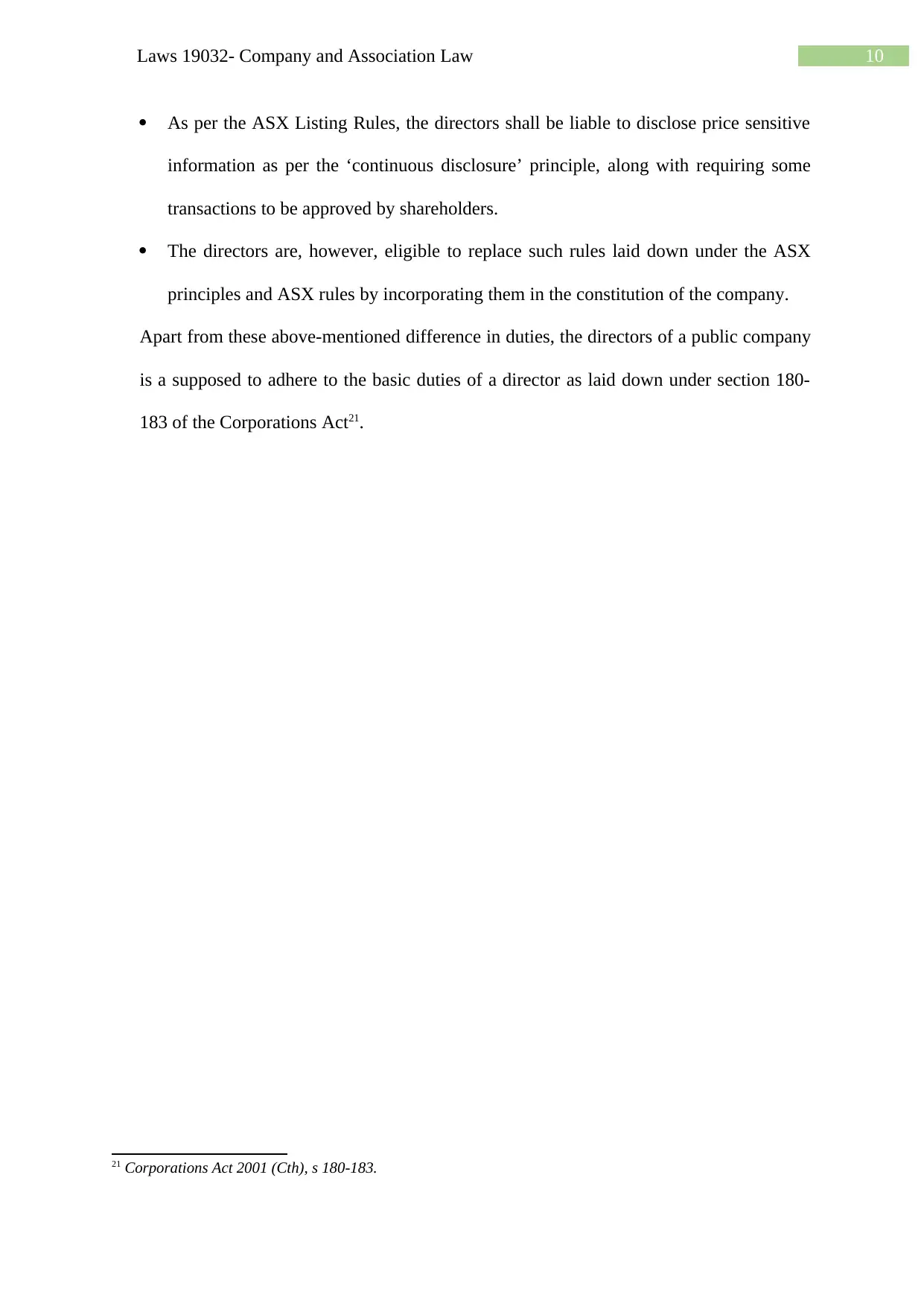
10Laws 19032- Company and Association Law
As per the ASX Listing Rules, the directors shall be liable to disclose price sensitive
information as per the ‘continuous disclosure’ principle, along with requiring some
transactions to be approved by shareholders.
The directors are, however, eligible to replace such rules laid down under the ASX
principles and ASX rules by incorporating them in the constitution of the company.
Apart from these above-mentioned difference in duties, the directors of a public company
is a supposed to adhere to the basic duties of a director as laid down under section 180-
183 of the Corporations Act21.
21 Corporations Act 2001 (Cth), s 180-183.
As per the ASX Listing Rules, the directors shall be liable to disclose price sensitive
information as per the ‘continuous disclosure’ principle, along with requiring some
transactions to be approved by shareholders.
The directors are, however, eligible to replace such rules laid down under the ASX
principles and ASX rules by incorporating them in the constitution of the company.
Apart from these above-mentioned difference in duties, the directors of a public company
is a supposed to adhere to the basic duties of a director as laid down under section 180-
183 of the Corporations Act21.
21 Corporations Act 2001 (Cth), s 180-183.
1 out of 11
Related Documents
Your All-in-One AI-Powered Toolkit for Academic Success.
+13062052269
info@desklib.com
Available 24*7 on WhatsApp / Email
![[object Object]](/_next/static/media/star-bottom.7253800d.svg)
Unlock your academic potential
Copyright © 2020–2026 A2Z Services. All Rights Reserved. Developed and managed by ZUCOL.





